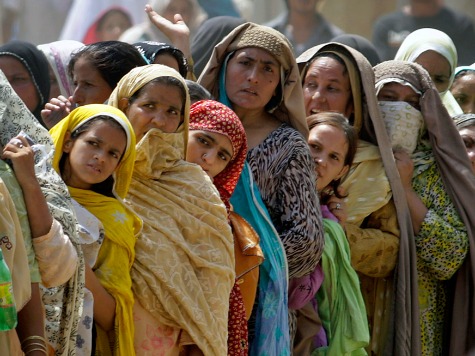
The Associated Press published an article Sunday about the men of the Pakistani village Mateela, who have kept women from voting for decades. However, the article makes no mention of Islam or Islamic fundamentalists such as the Taliban suppression female voters, instead citing “tradition” as the cause.
In places like Mateela, the fact that men decide women should not be allowed to vote is a decades-old tradition. Some men say women don’t have the mental capacity. Other times they don’t want wives and daughters to leave the house. Some simply don’t see the point.
Rubina Arshad said things are slowly starting to change as men and women become more educated. “This is the tradition and the culture, from many, many years ago. We could not cast the vote,” she said.
For comparison, Agence-France Press comprehensively covered the causes of female disfranchisement in a late-April preview of Pakistan’s elections:
Women’s rights activist Farzana Bari estimates that at least 11 million eligible women will not be able to vote simply because authorities have not granted them national identity cards.
The elections themselves present further barriers to women, with some religious leaders believing women voting is un-Islamic.
Voting for a man they do not know, some mullahs counselled in 2008, was grounds for automatic divorce – a social taboo few are prepared to entertain.
“Our society does not allow us to bring our women to vote,” said Sharif Khan, 50, a solar energy dealer in Miranshah, the main town in the tribal district of North Waziristan.
“We are afraid of the Taliban. They oppose women voting, so why should we take the risk?” he asked.
In many areas ruled under Islam, women are seen as inferior to men, mentally and physically. According to the Islamic practice of purdah, a woman’s place is the home, and women are often not allowed to leave the house without a male relative. “They do not go shopping, they do not work outside the house and they only go to the hospital in a dire emergency,” AFP’s report reveals.
The Christian Science Monitor quotes Sidra Ali, an activist encouraging voting in remote Pakistani areas, who laments, “The men do not allow the women to step out of the house… They treat the women here like livestock.”
A woman running for an assembly seat in northwestern Pakistan conceded her race in mid-April after threats from the Taliban, the fundamentalist Muslim political group that sprang to international attention after it was revealed to have harbored Al-Qaeda leader Osama bin Laden in Afghanistan.
Pakistani Taliban operatives shot a teenage girl in the head last year because she promoted education for women.
The AP’s political correctness on Islamic extremism is not without precedent. The Council on American-Islamic Relations (CAIR) last month thanked AP for its decision to change the definition of “Islamist” in their stylebook. Reporters are prohibited from using the word “Islamist” while talking about militants or extremists.

COMMENTS
Please let us know if you're having issues with commenting.